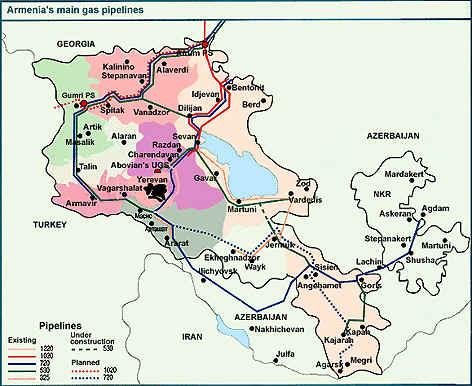Armenia's Strategic Significance: A Crucial But Neglected Potential NATO And U.S. Asset
Source: Squarespace/Unsplash
Armenia’s Positioning
Armenia, a nation nestled in the South Caucasus, has emerged as a key player in the geopolitical landscape, holding strategic importance for both NATO and the United States. As global dynamics continue to evolve, the unique positioning of Armenia has garnered attention, offering opportunities for collaboration and regional stability.
Armenia's strategic relevance is deeply rooted in its historical and geopolitical context. Situated at the crossroads of Europe and Asia, Armenia has been a historical bridge between civilizations and a meeting point for diverse cultures. Its geographic location, nestled between Turkey, Azerbaijan, Iran, and Georgia, places it at the crosshairs of geopolitical interests, making it a focal point for regional dynamics.
Armenia's commitment to democratic values enhances its standing as a reliable partner for NATO and the United States. The country's willingness to engage in political and economic reforms aligns with the principles promoted by NATO, fostering a shared commitment to democratic governance and stability.
Security Partnerships
One of the primary factors contributing to Armenia's strategic importance is its partnership with NATO. Armenia has actively engaged with NATO through the Partnership for Peace (PfP) program since 1994, fostering a relationship that extends beyond mere geographical significance. The PfP has allowed Armenia to collaborate with NATO members on various fronts, including military interoperability, peacekeeping operations, and defense reforms.
Furthermore, Armenia's contribution to international peacekeeping missions, particularly in Kosovo and Afghanistan, underscores its commitment to global security. These joint efforts strengthen Armenia's ties with NATO, positioning the country as a reliable partner in addressing contemporary security challenges.
Armenia and France also maintain a security and defense relationship that encompasses diplomatic cooperation, joint initiatives, and strategic collaborations. While Armenia is not a member of NATO, France, as a NATO member, engages with Armenia on various security-related matters, fostering bilateral ties that contribute to regional stability.
Defense cooperation between Armenia and France extends to areas such as military training, equipment, and joint exercises. While Armenia is not a member of NATO, French military expertise and collaboration contribute to enhancing Armenia's defense capabilities. This cooperation includes professional development programs and the exchange of military personnel, fostering a mutual understanding of defense strategies and tactics.
Source: Itera
Energy Security
Beyond security concerns, Armenia plays a crucial role in the broader context of energy security. The region, known for its energy transit routes and pipelines, makes Armenia a key player in discussions surrounding the diversification of energy sources and supply routes. Initiatives like the Southern Gas Corridor, aimed at reducing Europe's dependence on Russian gas, highlight Armenia's potential role in ensuring energy stability and diversification in the region.
Armenia, situated in the South Caucasus region, holds a strategic position that parallels Ukraine's significance near Russia. The country's location and the intricate network of pipelines traversing its terrain make Armenia a pivotal point of interest, impacting regional geopolitics, energy security, and international relations.
Armenia's location places it at the crossroads of Europe and Asia, surrounded by countries with diverse geopolitical interests. Bordered by Turkey, Azerbaijan, Georgia, and Iran, Armenia stands as a crucial buffer between regional powers. This geographical position has historically made the country a meeting point for civilizations, contributing to its strategic importance in the broader geopolitical landscape.
Source: Squarespace/Unsplash
Challenges and Opportunities
While Armenia's strategic importance is evident, it is essential to acknowledge the challenges the country faces. The Nagorno-Karabakh conflict with Azerbaijan has historical roots, and addressing the complexities of regional conflicts remains a delicate matter. The role of international actors, including NATO and the United States, in promoting peaceful resolutions and stability is crucial.
Similar to Ukraine's position as a buffer state between Russia and the European Union, Armenia finds itself at the center of regional dynamics and conflicts. The longstanding Nagorno-Karabakh conflict with Azerbaijan has regional implications, and the resolution of such disputes involves key international actors. Armenia's role in regional stability and conflict resolution draws attention from global powers seeking to maintain equilibrium in the South Caucasus.
Armenia's strategic location and role in energy transit make it a point of interest for international players, influencing their diplomatic and economic engagements. The country's ties with various actors, including the European Union, Russia, and the United States, contribute to the intricate web of international relations shaping the region.
Conclusion
Armenia's strategic significance to NATO and the United States extends beyond its geographic location. The country's commitment to security cooperation, energy stability, democratic values, and regional stability positions it as a valuable partner in addressing the complex challenges of the South Caucasus. As global dynamics continue to evolve, fostering strong ties with Armenia emerges as an imperative for NATO and the United States to navigate the geopolitical landscape and ensure a more secure and stable future.




